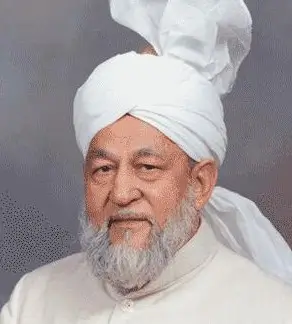If a person needs to join Isha prayer with Maghrib prayer and then finds that after saying his prayers, he is delayed in the mosque for some purpose and again says the Isha prayer with the congregation. As to my knowledge, he will not have to say his Bitar prayer again once he has said so. Would Huzoor advise us whether he will have to repeat his Sunnat prayer in such a case?
The fact is that if somebody joins Isha prayer with Maghrib for some definite reason, justified reason, then his prayer is all right. And in that case, in that justified reason, it is impossible for him to stay in the same mosque till the time when the real regular prayer begins, because then the reason is not justified. That is one possibility. The second is that reason was justified, but it had to be cancelled due to some other exigency. In that case, the option will open up. Do you understand that point? Yes. In that case, when the time for Isha prayer has come, because his reason for joining Isha prayer with Maghrib was already proved wrong, his fear, why he should say that.
So, he should say Isha prayer with the Jamaat because the fundamental in prayer is to say it in congregation. So, he should say Isha prayer in congregation. So, the prayer which is said in congregation has the overruling character, or the prayer said individually. I mean, that prayer cannot be called nafli or optional, which he said behind a regular imam and which was said in congregation. As compared to this, his previous prayer can be called nafli. So, in that case, he will have to repeat sunnah and witr as well after that prayer. But if somebody has said a prayer in congregation and happens to be in some other mosque or the same mosque at the time when the regular time for prayer has come and it is also said there behind another imam, that happens sometimes.
For instance, here, because of rain or because of some meeting, we have said a prayer, joined Maghrib with Isha, and this can happen in other mosques. And that same person comes here and finds me leading the prayer, that is Khalifatul Masih anyway, or some ameer for instance, and he considers that I should love to say prayer behind such a person and I would enjoy that more. In that case, because officially his prayer already has been accepted, this prayer would be voluntary prayer. And it would not cancel out the previous prayer. That is the formality of the previous prayer. Because it is not important who is leading the prayer. It is important that an imam should lead the prayer and that gives authenticity to the prayer.
So, in these two situations, the verdict would be different. You understand the point? If somebody has said a prayer individually due to some reason, and then if out of necessity he has to remain in this mosque while the Isha time regularly comes, then although he has said the prayer, it is advisable for him to repeat the prayer behind the imam in congregation. But if he does not, even then he is not liable to censure. So if he does not say, well and good, nothing is happening. But if he does repeat the prayer, then a prayer behind the imam has the overruling character. So that would be his real prayer from then on. That is to say, he considers his previous prayer to be nafli, decides to repeat the prayer in the regular time, and that would become his regular prayer. Then his sunnah would be repeated and also his witr would be repeated.
As far as witr is concerned, witr is always at the end. Witr caps the whole day, the whole 24-hour day, and that is always at the end. So it is impossible for any nawafil to occur after witr. If that witr is not cancelled out, then he can’t say Isha prayer afterwards. It is meaningless. Witr is said before and Isha is said afterwards. That is anyway wrong. Huzoor, I discussed with somebody who knew better than me. He said there is a hadith of the Holy Prophet ﷺ that once witr you have said, you will not say witr again. Witr again? No, I don’t think there is any such hadith. Then I must refer to him again, to the person advising. Once witr is said, I don’t think anything such arose. The point is that even if there is such an injunction, it applies to the ordinary situation. It is not an ordinary situation. That is to say, if you have said a witr, why should you?
There is no reason why you should repeat the witr. But if the whole thing was prior to its time, it was untimely, and you had said it only out of necessity. When it is proved that there is no necessity, and the time for prayer has come and you can say the prayer regularly, then that witr is automatically cancelled out. It is not repeating the witr then. There is no witr. The position demands then that you are led into a position as if you have not said a witr. But anyway, I doubt if there is such a hadith as you have mentioned. I will find out.






